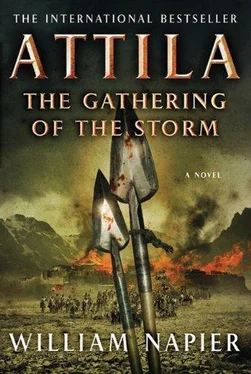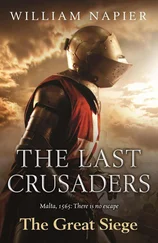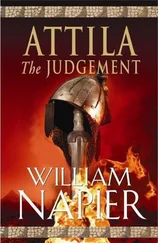William Napier - The Gathering of the Storm
Здесь есть возможность читать онлайн «William Napier - The Gathering of the Storm» весь текст электронной книги совершенно бесплатно (целиком полную версию без сокращений). В некоторых случаях можно слушать аудио, скачать через торрент в формате fb2 и присутствует краткое содержание. Жанр: Исторические приключения, на английском языке. Описание произведения, (предисловие) а так же отзывы посетителей доступны на портале библиотеки ЛибКат.
- Название:The Gathering of the Storm
- Автор:
- Жанр:
- Год:неизвестен
- ISBN:нет данных
- Рейтинг книги:3 / 5. Голосов: 1
-
Избранное:Добавить в избранное
- Отзывы:
-
Ваша оценка:
- 60
- 1
- 2
- 3
- 4
- 5
The Gathering of the Storm: краткое содержание, описание и аннотация
Предлагаем к чтению аннотацию, описание, краткое содержание или предисловие (зависит от того, что написал сам автор книги «The Gathering of the Storm»). Если вы не нашли необходимую информацию о книге — напишите в комментариях, мы постараемся отыскать её.
The Gathering of the Storm — читать онлайн бесплатно полную книгу (весь текст) целиком
Ниже представлен текст книги, разбитый по страницам. Система сохранения места последней прочитанной страницы, позволяет с удобством читать онлайн бесплатно книгу «The Gathering of the Storm», без необходимости каждый раз заново искать на чём Вы остановились. Поставьте закладку, и сможете в любой момент перейти на страницу, на которой закончили чтение.
Интервал:
Закладка:
There are many such tales among other peoples, of mad kings driven into the wilderness to live like animals: King Nebuchadnezzar of the Jews, who turned aside to eat grass like the oxen, and whose body was wet with the dew of heaven, till his hairs were grown like eagles’ feathers, and his nails like birds’ claws. Or one-eyed King Goll of the Celts, who fled from the field of battle not from cowardice, but maddened by that blood-red rage which grips men amid carnage. I heard a fragment of the haunting Song of King Goll sung long ago by a brown-eyed Celtic boy: And now I wander in the woods
When summer gluts the golden bees,
Or in autumnal solitudes
Arise the leopard-coloured trees;
Or when along the wintry strands
The cormorants shiver on their rocks;
I wander on, and wave my hands,
And sing, and shake my heavy locks.
The grey wolf knows me; by one ear
I lead along the woodland deer;
The hares run by me growing bold.
They will not hush, the leaves a-flutter round me, the beech leaves old.
Attila was no such sorrowful king nor idle folk tale. He was a living myth to his people, dressed in flesh and blood, back from the wilderness to dwell among them, and they beheld his glory.
World-bestriding conquerors are furious in their youth, and as impatient as youths even if they make old age. Alexander had conquered the world by twenty-nine. Hannibal faced and destroyed the flower of Rome in the field when he was but thirty, and Caesar chafed bitterly at not having brought the world to its knees before him by the same age. Attila was one with these men of world-hunger. But he was in his forties before he even tasted power. Some say he could have exercised that iron will of his and deposed Ruga far earlier taking the crown of the Huns and setting it on his own broad head. One glare from those leonine eyes, and not a man of the tribe would have dared oppose him. But Attila was wiser than that. He knew that patience is the nomad’s greatest weapon. He watched. He waited. And when he finally rode back into the camp of his people, it seemed that he not only had might but right on his side, having been preserved in the wilderness for so long. What trials and tribulations he must have faced there. And so his return only seemed the more extraordinary, the more miraculous. All the warriors of his tribe then believed in him, in a way they had never believed in Ruga, or even tough old Uldin before him. He was consort of the mountains, he was friend of the desert and brother of the waste places. There blew through him that same invisible wind that blew from heaven and coloured the shamans’ dreams. With him at the head of their armies, none could oppose them. That was what they believed, and he knew it. ‘An army that believes in something – anything – will always defeat an army that believes in nothing.’
His army would believe in him.
4
It was as Chanat had foretold. Hearing somehow – in the voices of the wind, perhaps – of the things that had transpired in the camp of the Huns, and the return of the Prodigal Son, come murdering his own uncle with his bare hands and a rusting arrowhead – Little Bird reappeared.
Impossible to say if he had aged at all, or how many summers his life had counted now. His raven-black hair was streaked with random grey, but his face still had the strange bright innocence of a child, though he might have been forty, or sixty. The skin stretched thin over his broad Asiatic cheekbones, his colour was high and hectic, and his eyes were as darting and bright and malicious as a mink’s. He had no facial hair nor shadow of it anywhere. Even for a Hun he was as smooth-cheeked and innocent as a boy. He wore his hair up in a topknot after the fashion of the people, but tied with a scrap of bright flowery silk like a woman. He wore a string decorated with little animal skulls round his neck, and bangles and bracelets, also like a woman. He tipped his head to left and to right as he talked, mocking both himself and the man he addressed. His clothes were bright and tattered, and his ripped goatskin shirt, loosely laced, was decorated across his chest and right around the back with coarsely drawn little black stick-men.
When he threw his cloak off and danced, spinning on the spot, his nostrils filled with sweet hemp smoke, his eyes rolling back in his head and his arms held wide, the stick-men whirled round and blurred together, and it was as if there was no distinction between one and another but all men merged together, some ascendant and some descendant on the wheel of fortune, but none in the end more than a brief black blur in the white light of eternity.
He addressed King Attila. The king was at his fireside, eating with a handful of his chosen men. Chanat and Orestes sat close by, and also young Yesukai and wily Geukchu.
Little Bird sat uninvited among the men and held his hands together like a Christian at prayer and smiled sweetly at the king.
‘Great Tanjou,’ he said, ‘what an ascent you have made in the world of dreams, who only seven days’ since would not have been allowed into camp even to lick out King Ruga’s night-bowl!’
Attila eyed the madman over the legbone he was gnawing. ‘Welcome back, Little Bird,’ he rumbled.
‘My lord!’ protested Yesukai.
‘Holy and untouchable you may be, boy,’ growled Chanat, fixing his dark eyes on the little shaman from under his arched black brows, ‘but if you-’
‘Hark!’ squealed Little Bird, staring at Chanat wide-eyed. ‘The old bag of bones comes back to life and speaks. I thought you were dead long since, old Chanat.’
Chanat made to seize him by his dancing topknot and drag him away into the darkness, holy man or no, but Attila held out his arm. ‘Words, words, words,’ he said.
Little Bird looked away from Chanat with a sneer, and then resumed his sickly sweet smile as he gazed at King Attila again. His voice was singsong and ridiculous.
‘A wanderer and an exile upon the earth you were, Lord Widow-Maker, and a detested pariah dog amongst men, with your noble brow cruelly marked with the three shameful scars of a traitor. How far and fast you have climbed in the world of dreams! But one can fall as well as rise, for there is no knowing the will of the wicked and wayward gods, and conquests and triumphs in this world of dreams have all the longevity of virginity! Though doubtless Great Tanjou, oh my Attila, Little Prince of Everything and Nothing – doubtless the gods will favour you especially, and you will live for ever and conquer all the world. Of course you will.’
Still Attila did not react.
Little Bird sighed. He sat cross-legged in the dust and wagged his head in vexation. Then he looked up and said in a more normal voice, ‘So, Great Tanjou, where have you been? What have you done?’
Attila set down the legbone and wiped his lips. ‘Everywhere,’ he said. ‘And everything.’
Little Bird liked the answer and smiled. ‘And why did you not return earlier?’
‘You know that. The law of the tribe was against me.’
‘Such a lord as yourself,’ put in Geukchu smoothly, ‘need have no fear of the law.’
‘Do not flatter me,’ said Attila, not even looking at him, his eyes still fixed on Little Bird. ‘I am not superior to all laws. Nor to all lawgivers.’
There was a silence in the night. Little Bird understood his words.
‘Besides,’ said Attila, ‘there were other things for me to do.’
‘What things have you done?’ asked Little Bird, his voice quieter.
Attila’s voice, too, was quiet. ‘What things have I not done?’
The fire crackled. The men around him sat expectant, almost fearful, their eyes upon him. Only Orestes looked at the ground, while his king murmured strange and ancient words.
Читать дальшеИнтервал:
Закладка:
Похожие книги на «The Gathering of the Storm»
Представляем Вашему вниманию похожие книги на «The Gathering of the Storm» списком для выбора. Мы отобрали схожую по названию и смыслу литературу в надежде предоставить читателям больше вариантов отыскать новые, интересные, ещё непрочитанные произведения.
Обсуждение, отзывы о книге «The Gathering of the Storm» и просто собственные мнения читателей. Оставьте ваши комментарии, напишите, что Вы думаете о произведении, его смысле или главных героях. Укажите что конкретно понравилось, а что нет, и почему Вы так считаете.












